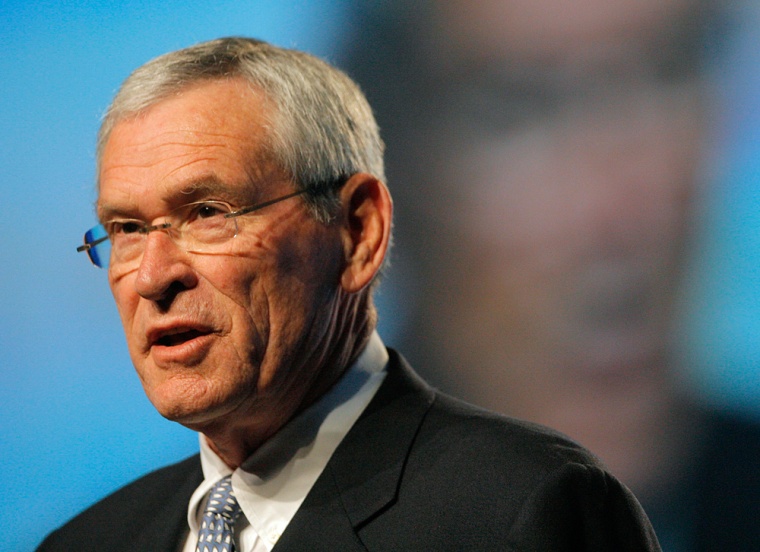Edward Whitacre Jr., who led AT&T Inc.’s expansion into the largest telecommunications company in the nation, announced unexpectedly Friday that he will retire as chairman and chief executive in June.
Whitacre, 65, also announced at the company’s annual meeting that the board has elected Chief Operating Officer Randall Stephenson, 47, to replace him in both roles on June 3. Stephenson has been the chief operating officer since 2004.
Whitacre will enjoy a rich payout in retirement of more than $161.6 million, including $73.8 million in deferred compensation and the $84.7 million in his pension fund.
He’ll also make more than $1 million per year for three years as a consultant for the company, according to AT&T’s proxy statement. During that time, he’ll enjoy continuation of his benefits and some tax help, including the payment of about $15,600 in taxes per year.
An outspoken Texan known for blunt remarks on industry topics, Whitacre has worked for AT&T and its predecessor companies for 44 years.
In his 17 years at the helm, he presided over the company’s growth from a regional telephone provider to the nation’s largest provider of wireless, broadband and traditional phone service through an aggressive string of acquisitions, most recently the $86 billion purchase of BellSouth.
Whitacre’s contract doesn’t expire for another year, and it wasn’t immediately clear what spurred his decision to step down now.
“I’ve always considered it my main priority to ensure the long-term viability of the company,” Whitacre at the meeting. “I have great confidence in the next generation of leadership.”
Though the company’s stock has rallied and is trading at 5-year highs, the compensation of Whitacre and other AT&T executives has been the subject of debate among some shareholders, who have lobbied for more say in how much the executives earn. On Friday, three shareholder-driven initiatives to limit compensation and pension funds were defeated.
Patrick Comack, an analyst for Zachary Investment Research, said Whitacre’s decision to leave sends him out on top.
“He built AT&T into a juggernaut,” said Comack, who is often critical of AT&T because of the ongoing competition it faces from cable television. “He’s highly respected on Wall Street, a straight shooter.”
Whitacre also announced at the meeting that the board had approved a 6.2 percent increase in monthly benefits for AT&T’s oldest and poorest retirees. Roughly 88,000 former employees who retired before 1996 and receive less than $1,200 per month will get the increase starting in October.
AT&T, formerly named Southwestern Bell and then SBC Communications, was the smallest of the seven “Baby Bells” spun off in the 1984 government-ordered breakup of the national AT&T monopoly.
Under Whitacre, who began at Southwestern Bell in 1963 as a facility engineer, the company acquired three of its larger Bell siblings, as well as its former corporate parent, the AT&T long-distance business created in the breakup, and renamed itself AT&T in the process.
The acquisition of BellSouth gave AT&T full ownership of Cingular Wireless, which had been a joint venture and is the nation’s largest wireless carrier with 62 million subscribers.
The selection of Stephenson, who began with Southwestern Bell in 1982, was not a surprise. Whitacre is known to be loyal to his team, with many of the management changes being internal promotions.
David Dorman, the chief executive of the acquired AT&T long distance business, had wanted to be designated the heir apparent and resigned when it was clear Stephenson would likely get the nod, Comack said.
